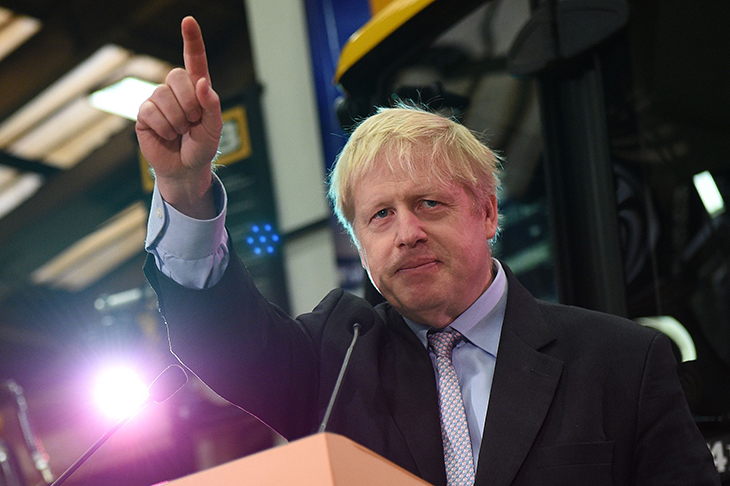Sit down, my swivel-eyed Brexiter friend, and pour yourself a stiff whisky. I’ve something to tell you that’s going to be a bit difficult for both of us. Sitting comfortably? Your swivel-eyed Remainer columnist has discerned just the tiniest glint of a silver lining to the dark cloud of a possible Boris Johnson premiership.
And the reason? It’s this. The most important ability the next Tory leader must possess is the ability to break bad news. To get away with this and bring the voters with you, real leadership is required: not just eloquence, not just empathy, but the command, the confidence and the sheer guts to face the inevitable, grab the bull by the horns, and spit it out. And before the end of this autumn, somebody is going to have to tell the British people that we aren’t leaving.
I write this just before the elections to the European Parliament. You may read me after the polls have closed and before the results are released. But I’ll take a stab, now, at those results. Up to half the total electorate will have bothered to vote, and the other half will have stayed at home. Around a third of those who did vote will have voted for Nigel Farage’s Brexit party: the only hard-Brexit, no-deal-if-necessary party standing.
It will follow that about a third of at most half the electorate will have voted for a hard, no-deal-if-necessary Brexit. That’s 17 percent maximum, but let’s be generous to Nigel and call it a fifth.
That will mean that four-fifths of the electorate will have declined the best opportunity we British will get to signal that we’re ready and willing to leave without a deal. Nevertheless, the result will be splashed across next week’s papers and news reports as a terrific result for hardline Brexiters. Their friends in the parliamentary Conservative party will be renewing calls for Theresa May to make way for a ‘real’ Brexiter as leader and prime minister, and to save the party from evisceration by Mr Farage.
That such an eventuality may not claw back from the Brexit party as many former Tories as it will lose centrist Tories like myself will not occur to them — or, if it does, will be suppressed as unhelpful to their quest to ‘purify’ the Tory party: something they now want to do regardless of the immediate damage it threatens to Conservative fortunes or the British economy.
Mrs May may not go as fast or easily as people think, but in the end go she must; and, for a while at least, we shall have a new Conservative prime minister, having chosen a new leader of the Conservative party.
But as my journalistic colleagues never tire of pointing out, this won’t change the arithmetic of the House of Commons. Three assertions, of which I’m as sure as one can be of anything in politics, follow. First, this parliament will never vote for, and will do everything it can to stop, a no deal or even ‘managed’ no-deal Brexit. Second, no majority will be found for any half-in half-out exit deal, because such a ‘Brexit in name only’ will always be embarrassingly inferior to simply remaining a full member.
Thirdly, a new British prime minister will have no more success than Mrs May in pushing the rest of the EU into making a sharply better offer.
From these three assertions flows only one outcome. A new British prime minister, having visited the Queen to check in, and having during the course of leadership elections vowed to get a better deal from Brussels on pain of leaving without a deal, will have to hotfoot it to Brussels — and will have to return more or less empty-handed.
Such a PM will then be under enormous pressure to try to get the United Kingdom out of the EU with no deal or (more likely) a ‘managed’ no deal. At this point, both Houses of Parliament will awake from their fitful slumber and stop this happening.
The bind our PM will be in is as simple as it will be cruel. He or she will have promised the electorate something that she or he is quite unable to deliver. Nor will this PM be able to blame any unforeseen circumstance, any act of God or man, for impasse reached, as the whole thing has been horribly clear for years now. It will be fess-up time — though of course the speech required can be larded with references to what awful monsters the EU are, etc, etc, actually sticking to their guns and doing what they always said they’d do, the cheating rotters.
Now look at the likely candidates on offer for the Tory leadership, and try, in each case, to imagine each one’s attempt to carry off this huge rhetorical challenge.
The speechwriter’s brief? To explain why Her Majesty’s Government has decided to revoke our Article 50 notification and return to the drawing board to consider Brexit anew, without pressure of pesky EU-imposed deadlines.
I think Boris could do it. ‘Brazen’ is his middle name. Mr Johnson could infuse a humiliating retreat with the spirit of Dunkirk as, under heavy enemy shelling, our little boats bring back the British negotiating team from foreign shores. ‘Reculer pour mieux sauter, my friends,’ he’d cry — ‘or, as they say in France, “Rip it up and start again.”’
Rory Stewart could do it, too, making surrender sound almost elegiac. Michael Gove is more than capable of getting straight on to the front foot and turning a lament for failure into a hymn to patience, persistence and pure reason.
But Amber Rudd? Jeremy Hunt? Sajid Javid? Matthew Hancock? I struggle to picture the scene except with an inward cringe. Dominic Raab might simply explode.
But it remains likely that almost the first big thing our next prime minister is going to have to do is declare a ceasefire with Europe, a rethink, and an indefinite delay. Which Tory will have the tongue — and the stomach — to do it? This may prove the next big question.
This article was originally published in The Spectator magazine.


















